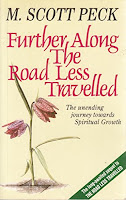 |
| (Amazon UK link) |
It’s quite an old book now, first published in 1993, fourteen years after the publication of the first book. In the intervening years, the author had decided that, after weighing up many options, he believed that the Christian faith made the most sense, and that he would follow Jesus. So this book has a far more spiritual emphasis than the earlier one, with many mentions of God.
But it’s essentially a book bringing some of the theories of psychiatry - or, at least, Scott Peck’s understanding of it - to the general public. The writing is excellent: clear and interesting without either extreme of being over-technical or condescending. I had forgotten most of what was explained in the first book, but it didn’t seem to matter.
One of the chapters struck me particularly. It was about general stages of development of humanity - or, as I understand it, groups, or cultures, or ideas. They’re not new ideas; I already knew, for instance, that to move from chaos or barbarianism into a more democratic, free lifestyle or society there generally had to be a period of strict laws, possibly martial law (as happened under Ancient Rome, for instance). But I hadn’t taken in that to move between strict laws and open democracy there needs to be a period of questioning, possibly rebellion.
I had not, however, interpolated this into normal human development. As the author points out, a baby’s world is chaotic and it takes a couple of years, at least, for a child to figure out all his boundaries. Young children then tend to be quite black-and-white in their thinking, observing rules and expecting others to do so. The teenage years are typically full of questions (sometimes rebellion) as a young person decides that not all rules make sense. And, all being well, by the time they’re in their twenties or so, they have started to develop some balance, thinking for themselves, accepting that some rules are important; able to query when relevant, but also able to accept authority when appropriate.
This felt like an ‘aha!’ moment, when what I knew and observed already fell into place quite neatly. The author explains that some people are stuck in earlier stages and that it’s not possible to move from the first or second stage directly to the fourth: there always has to be progress in the order given (although the time frame and specifics will, of course, vary). This helps to explain why someone at ‘stage four’ (which he calls the beginning of maturity) won’t be able to convince or persuade someone entrenched in ‘stage two’ thinking, of whatever type, until they start questioning for themselves. The churches, the author says, are full of people who are at ‘stage two’ - some of them fundamentalists who won’t see outside the box, but others nice, friendly people who have no need to rebel or question,and are happy to go along with what they have always been told.
Other chapters look at issues such as spirituality, at psychotherapy in general terms and at what was called the ‘New Age’ movement - and there’s a warning against reacting too strongly against anything. The author writes are very balanced chapter, with lists of the positive and negative aspects of the New Age ideas. I found much of the writing enlightening and helpful; the only one I thought rather weird was the final one, about sexuality and spirituality. And the epilogue, which is the transcript of a talk, was rather heavier - or, possibly, just harder to read because it was a talk rather than written intended for a book.
But overall, I thought this an excellent book; I hope I’ll read it again before too many years have passed, and I hope that the principles and theories in it will stick with me in the meantime.
Review copyright 2023 Sue's Book Reviews
No comments:
Post a Comment